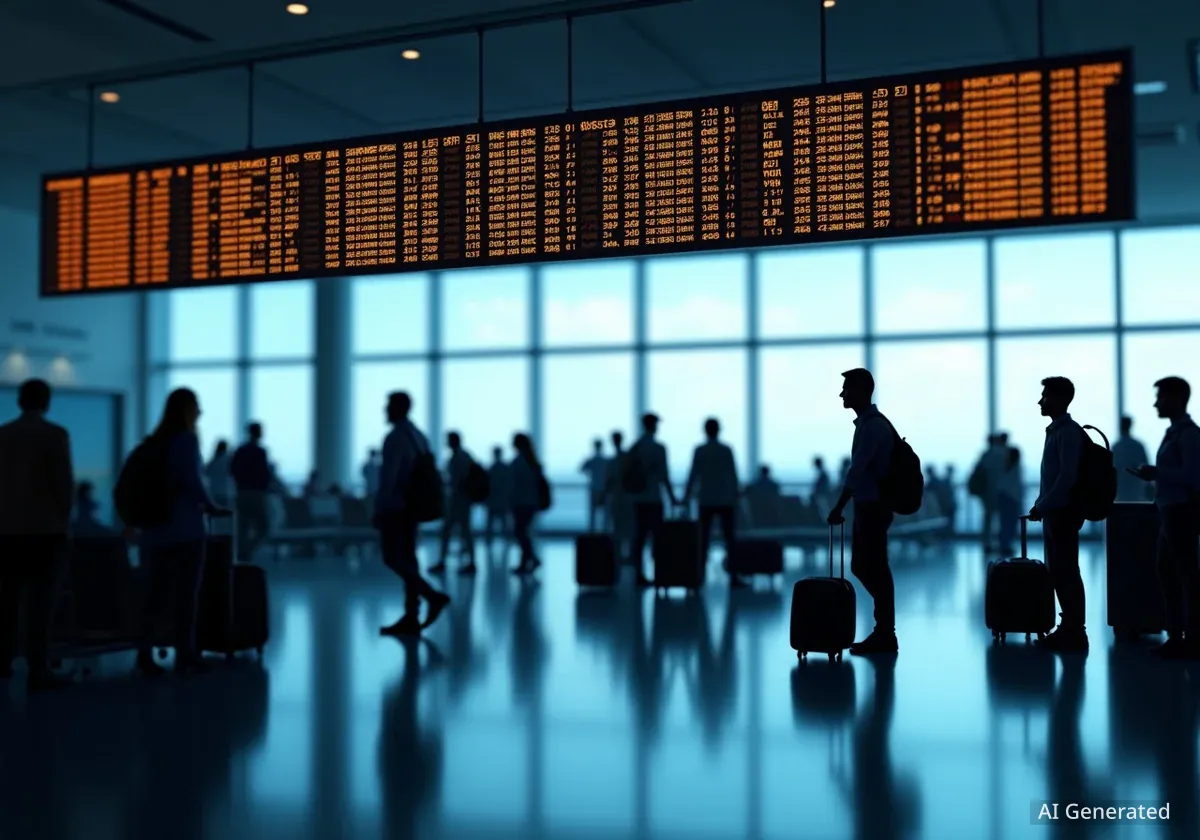Air travelers across the United States have faced significant disruptions, with thousands of flights delayed. Staffing shortages among air traffic controllers, exacerbated by a prolonged government shutdown, are contributing to widespread operational challenges at major airports.
Key Takeaways
- Over 7,600 flights experienced delays on Sunday.
- Staffing issues at air traffic control centers impact major hubs like Dallas, Chicago, and Newark.
- Approximately 13,000 air traffic controllers are working without pay during the government shutdown.
- Transportation Secretary Sean Duffy expressed concern over potential future disruptions as paydays approach.
Nationwide Flight Delays Continue
The Federal Aviation Administration (FAA) reported late Sunday that air traffic control staffing issues were causing delays at several key airports. Dallas, Chicago, Atlanta, and Newark were among the affected locations. These issues emerged as the U.S. government shutdown reached its 19th day.
By Monday morning, some of these staffing problems appeared to be resolved in certain areas. However, a new staffing trigger was identified in Philadelphia. This situation could also affect flights heading into Newark Liberty International Airport in New Jersey.
Flight Delay Statistics
- Sunday Delays: More than 7,600 flights within the United States were delayed.
- Monday Morning Delays: 846 flights within the U.S. were delayed as of early Monday.
- Airline Impact: Over 20% of American Airlines and Southwest Airlines flights were delayed on Sunday.
The FAA had previously indicated that numerous staffing triggers were received for Sunday evening shifts. This could have led to delays in cities like Las Vegas and Phoenix due to air traffic control absences. By Monday morning, no staffing triggers were listed for these two airports.
Impact of Government Shutdown on Air Traffic Control
The ongoing government shutdown has placed immense pressure on essential aviation personnel. Approximately 13,000 air traffic controllers are currently working without pay. Additionally, around 50,000 Transportation Security Administration (TSA) officers are also required to work unpaid.
Transportation Secretary Sean Duffy addressed the situation on Monday, stating, "Because of the government shutdown, air traffic controllers will not be paid, so a lot of them are seeking other work to keep their families afloat." He added, "I hope we don't see more disruptions. But as this gets closer to payday, I think you could see more of that through the airspace."
This financial strain on air traffic controllers raises concerns about their ability to continue working. The search for alternative employment could further deplete staffing levels, potentially leading to more significant disruptions in the future.
Previous Staffing Challenges and Recovery
Earlier this month, the aviation sector experienced a period where more than 23,000 flights were delayed over a single week. At that time, Secretary Duffy noted that 53% of flight delays were attributable to staffing issues. This was a significant increase compared to the normal rate of 5%.
While staffing issues had shown some improvement over the past week, the current shutdown introduces renewed challenges. The situation highlights the fragility of the air travel system when essential personnel are under financial duress.
Historical Precedent: 2019 Shutdown
During a 35-day government shutdown in 2019, the number of absences among controllers and TSA officers increased significantly. This led to longer checkpoint wait times at various airports. Authorities were compelled to slow air traffic in key regions like New York and Washington, ultimately pressuring lawmakers to resolve the standoff quickly.
Understaffed Even Before Shutdown
The current crisis is unfolding against a backdrop of existing understaffing within air traffic control. The FAA is reportedly short by about 3,500 air traffic controllers compared to its targeted staffing levels. This deficit has already led many controllers to work mandatory overtime and six-day weeks, even before the shutdown began.
This pre-existing strain on the workforce makes the impact of the shutdown even more severe. The inability to pay these dedicated professionals risks further exacerbating an already challenging staffing situation.
Other Contributing Factors to Delays
While staffing issues are a primary concern, other factors also contributed to the high number of delays over the weekend. Weather conditions played a role in some areas. A major Formula 1 race held in Austin, Texas, also added to the complexity of air traffic management and demand.
However, the core issue of air traffic control staffing, intensified by the government shutdown, remains a critical point of focus for airlines, unions, and travelers alike. Calls for a swift resolution to the government standoff are growing louder from all segments of the aviation industry.
- Unions representing air traffic controllers and other aviation workers have urged a quick end to the shutdown.
- Airlines are also pushing for a resolution to minimize operational and financial losses.
- The debate over the shutdown continues, with both political parties assigning blame.
The ongoing situation underscores the vital role of air traffic controllers and TSA officers in maintaining the safety and efficiency of national air travel. Their unpaid labor during the shutdown creates a precarious situation for the entire system.





